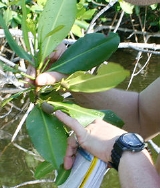
Rhizophora
Overview
Genus
In biology, a genus is a low-level taxonomic rank used in the biological classification of living and fossil organisms, which is an example of definition by genus and differentia...
of tropical mangrove
Mangrove
Mangroves are various kinds of trees up to medium height and shrubs that grow in saline coastal sediment habitats in the tropics and subtropics – mainly between latitudes N and S...
trees, sometimes collectively called true mangroves. The most notable species is the Red Mangrove (Rhizophora mangle
Rhizophora mangle
Rhizophora mangle, known as the red mangrove, is distributed in estuarine ecosystems throughout the tropics. Its viviparous "seeds," in actuality called propagules, become fully mature plants before dropping off the parent tree...
) but some other species and a few natural hybrids are known. Rhizophora species generally live in intertidal zone
Intertidal zone
The intertidal zone is the area that is above water at low tide and under water at high tide . This area can include many different types of habitats, with many types of animals like starfish, sea urchins, and some species of coral...
s which are indundated daily by the ocean. They exhibit a number of adaptations to this environment, including stilt-roots
Aerial root
Aerial roots are roots above the ground. They are almost always adventitious. They are found in diverse plant species, including epiphytes such as orchids, tropical coastal swamp trees such as mangroves, the resourceful banyan trees, the warm-temperate rainforest rātā and pōhutukawa Aerial roots...
that elevate the plants above the water and allow them to respire
Cellular respiration
Cellular respiration is the set of the metabolic reactions and processes that take place in the cells of organisms to convert biochemical energy from nutrients into adenosine triphosphate , and then release waste products. The reactions involved in respiration are catabolic reactions that involve...
oxygen even while their lower roots are submerged, and a cytological
Cell biology
Cell biology is a scientific discipline that studies cells – their physiological properties, their structure, the organelles they contain, interactions with their environment, their life cycle, division and death. This is done both on a microscopic and molecular level...
molecular "pump" mechanism that allows them to remove excess salts from their cells.
Unanswered Questions

